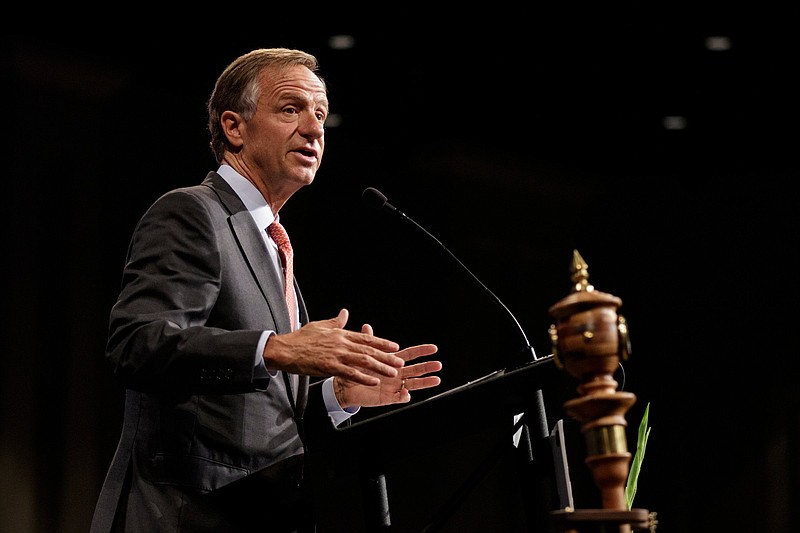NASHVILLE - Over the course of eight years in office, Republican Gov. Bill Haslam exercised his veto power just five times to strike down would-be laws passed by the GOP-controlled General Assembly.
There's a reason for that, said Haslam, who leaves office in January.
While the state Constitution grants wide powers to a governor for appointing commissioners and presenting an annual budget, when it comes to passing bills, Tennessee representatives and senators can easily override a governor if they can agree to do so.
 Gov. Bill Haslam listens to a speaker during a visit to the campus of the University of Tennessee at Chattanooga on Thursday, Nov. 8, 2018, in Chattanooga, Tenn. Gov. Haslam released the fifth annual report by the Employment First Task Force during the visit, which shows the task force's efforts to increase employment for people with disabilities.
Gov. Bill Haslam listens to a speaker during a visit to the campus of the University of Tennessee at Chattanooga on Thursday, Nov. 8, 2018, in Chattanooga, Tenn. Gov. Haslam released the fifth annual report by the Employment First Task Force during the visit, which shows the task force's efforts to increase employment for people with disabilities.All it takes is a constitutional majority - the same 50 votes needed in the 99-member House and 17 in the 33-member Senate to pass a bill in the first place.
"In Tennessee, the governor actually, relative to other states, is a fairly powerful governor," Haslam said last week in a Times Free Press interview. "You get to appoint all your commissioners without approval. You get to appoint a lot of the boards. The budget process begins with the governor, etc.
"Where it's not strong is the veto, and it just takes a simple majority" override, Haslam noted.
"So a governor really has to decide what his or her strategy going to be," the governor explained. "Is it going to be 'I'm going to veto a lot of things that if the same people vote for it the second time as did the first time they'll override it?'" Or, he said, "take the approach that we did, which is to say, 'We're going to work as hard as we can on the front end to get the bill as acceptable as we can.'"
He said in those instances, it was a question of being able to reach the "point where we think, well, this isn't the way we would do it, but it's at least acceptable. Then you go ahead and sign it, or maybe to make a point let it become law without your signature."
But he noted that "occasionally, I think even then something needs to be vetoed."
Left unsaid is another traditional approach taken by governors, which is to work to have supporters kill the bill in subcommittee, full committee or work to deny the measure from getting a majority on the floor.
Tennessee is one of only six states in which a majority of legislators can override a governor, according to the Council of State Governments' 2016 Book of the States. Alabama, Arkansas, Indiana, Kentucky and West Virginia also have simple majority veto override provisions, although in one case it's a majority of lawmakers present.
Many states have two-thirds or three-fifths majority provisions required to override vetoes.
Haslam issued his lone 2018 veto when he struck down a bill that would have required insurance coverage for state employees for proton therapy. It's a targeted radiation used for brain, lung, breast and neck cancer.
While it passed by wide margins, Haslam said in his veto message that the state "is committed to high-quality care that is medically appropriate and fiscally responsible for patients and taxpayers, but this mandate could put patients at risk and expose them to excessive charges from out-of-network providers."
In 2016, Haslam vetoed a controversial measure that sought to make the "Holy Bible" Tennessee's official state book. It would have made the state the first to do so. Critics had raised numerous objections, including saying such a law would diminish the Bible and that it was government intrusion.
Haslam cited a 2015 Tennessee Attorney General opinion raising concerns the bill could violate the state and federal constitutions.
"In addition to the constitutional issues with the bill, my personal feeling is that this bill trivializes the Bible, which I believe is a sacred text," Haslam wrote.
Other bills vetoed by the governor were:
» Flash mob bill: In 2014, Haslam vetoed a bill aimed at vandalism by "flash mobs" because the law had a number of unintended issues, including cutting penalties for people who dumped their trash on someone else's property.
» "Ag-gag" bill: In 2013, Haslam vetoed the bill that would have made it a crime to secretly record video of animal abuse. It came after a graphic undercover video made by a Humane Society of the United States investigator in which a Shelby County trainer of Tennessee Walking Horses was subjecting show horses to practices banned decades ago. First Amendment advocates and others raised constitutional concerns.
» "All-comers policy": Haslam struck down a 2012 bill that sought to strip Vanderbilt University of state funding because of a policy requiring campus groups admit LGBT students.
Contact staff writer Andy Sher at asher@timesfreepress.com or 615-255-0550. Follow on Twitter @AndySher1.
